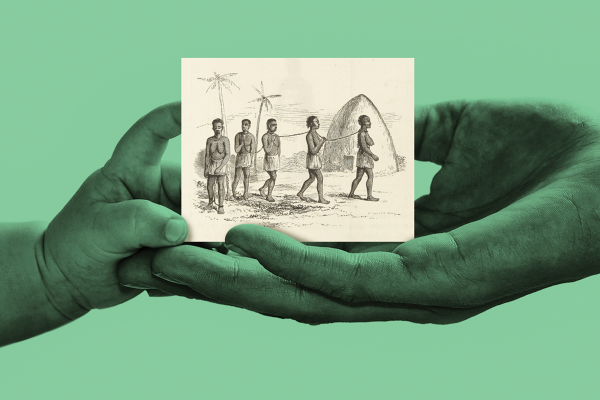HOW CAN SOMEONE born white take on new flesh when they are old?
This is the question I hear when I read the story of Nicodemus during this Black Lives Matter moment amid the 400-year-long freedom struggle of Black people in the U.S. “How can someone be born when they are old? Surely they cannot enter a second time into their mother’s womb to be born!” (John 3:4). How?
In 1707, my sixth great-grandfather bought my sixth great-grandmother at a slave auction at a French military post in what is now Mobile, Ala. She, later “christened” Thérèse, was a 10-year-old Chitimacha girl. He, Jacques Guedon, was a 17-year-old from Nantes in Brittany who had been recruited into the French colonial navy.
The Chitimacha were the most powerful nation along the Gulf Coast. Prior to contact with Europeans, the Chitimacha lived in a sophisticated matrilineal culture of classes and clans that served them for more than 10,000 years—through disease, war, and climate changes. They vigorously and continually defended their homeland against incursions and slave raids by English, Spanish, and French military, migrants, and missionaries. Today, they are the only tribe in Louisiana to still occupy a portion of their aboriginal homeland.
But a young French-Canadian commander named Bienville was tasked with establishing a fort at Mobile and defending it against the English. He needed to make alliances with native nations—primarily the Chickasaw and Choctaw—or severely weaken those that refused. To accomplish these twin goals and build up his personal wealth by selling Indian slaves, Bienville led his regiment in a night raid on Thérèse’s village. Likely all the adults were massacred. The dozen or so children left alive, including Thérèse, were rounded up for sale. It was a minor skirmish in France’s half-hearted attempt to establish and maintain extractive trade routes for maximum profit and minimum outlay, an expedient conquest to boost political standing and pay off debts.
Guedon took the enslaved Thérèse to the military post in Natchitoches, La. The Spanish Catholic Church, influential in the region and with laws against enslaving Indigenous people, encouraged Guedon to “Christianize” his relationship with this young woman—with whom he had three daughters—and so he “married” her at the nearest Spanish fort. She was given a “Christian name,” Marie Anne Thérèse de la Grande Terre. My maternal ancestors lived in the Natchitoches region until the 1930s.
WHY REVISIT THIS entangled and complicit family history? Veteran David Peters says, “If PTSD results from being the prey—reexperiencing the feeling that something is hunting you, hurting you, trying to kill you—then moral injury results from being the predator—where you have done things to hurt people.” We know trauma is passed down in families. Is moral injury also transferred from one generation to the next?
The story of Jacques and Thérèse illustrates how the two sides of the trauma coin live in a family. The predator “marries” the prey amid larger economic forces (and their political and military enforcers) and they bear children.
Colonial conquest was designed to win every time: sadistic violence that enlisted the services of theology to create an “other” for purposes of consolidating land and power. “First contact” in this branch of my family was cruel, carried out under cover of Catholic imperialism, and spawned wealth over generations as these French-Chitimacha ancestors became “white.” At the same time, France and Spain’s Catholic empires—always accompanied by zealous notetakers—kept the records of soldiering and commerce, trade and land acquisition, baptisms and burials that allow me entry into my past. This is how we examine the “dirty pain,” as therapists call it, of our past: the moral culpability of conquest, enslavement, and color lines, as well as the “clean pain” of native survivance, generative power, and a creole culture.
The intertwining of moral injury and trauma are destiny only if we let them be. Weaponized whiteness, while both hereditary and communicable, is not an idiopathic disease. For “white” folks, reentering the stories of our past can bring us to sources of unacknowledged injury to others and unhealed trauma in ourselves, which manifest now as white supremacy and systemic racism. Not, let me emphasize, for the purpose of “performative allyship” through a recitation of white woundedness. But instead for the purposes of being “born again,” both in flesh and in spirit (John 3:6).

Got something to say about what you're reading? We value your feedback!







